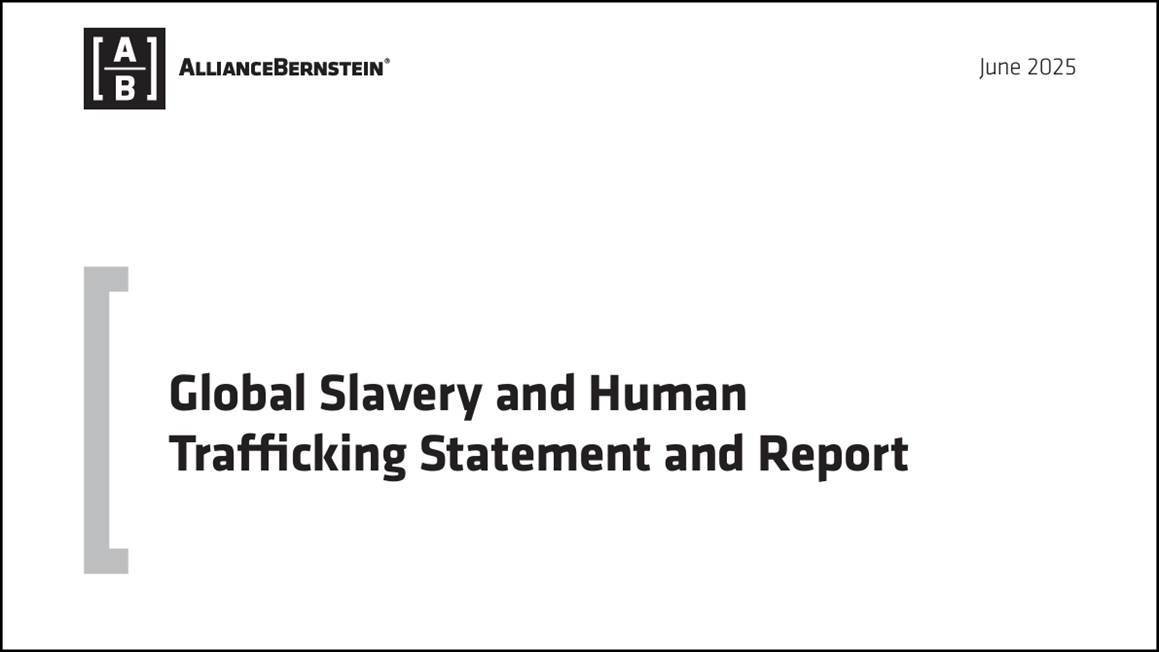-
Overview
-
Integration & Engagement
-
Solutions
-
Reporting Center
-
Proxy Voting
- Overview
- Integration & Engagement
- Solutions
- Reporting Center
- Proxy Voting
History of Our Involvement
Related Insights
Investment Teams Lead the Way
At AB, our Responsible Investing team helps portfolio managers and analysts consider and engage on material ESG risks and opportunities holistically and consistently, challenging investment teams’ thinking and encouraging analysts to incorporate this perspective into their financial models and outlooks. This robust approach helps teams consider material ESG risks and opportunities throughout their investment processes—ultimately driving better client outcomes.
Process in Action
Equip Our Investment Professionals with Education, Tools and Processes
Identify and Assess Materiality of ESG Risks and Opportunities
Engage with Issues on ESG Risks and Opportunities
Document ESG/Engagement Research and Conclusions
Incorporate ESG Findings into Models and Company Research
Integrate ESG Conclusions into Portfolio Decisions
We integrate material ESG factors into most of AB’s actively managed strategies (approximately 78% of our actively managed strategies as of June 30, 2025). AB engages issuers when it believes the engagement is in the best financial interest of its clients. Data points as of June 30, 2025.
The Active Engagement Advantage
Engagement is important to our process as active investors. Each year, AB analysts engage with leaders of companies and noncorporate entities, including municipalities, supranational and sovereign issuers. We also engage selectively through our proxy-voting activities.
These connections allow us to assess, discuss and encourage better business practices and approaches to address rapidly evolving material ESG issues. We believe that engagement can drive better research and better outcomes for our clients.

Climate Academy
AB and the Columbia Climate School are partnering to address the risks and opportunities related to climate change.
How Does Engagement Make a Difference?
We engage with issuers for two main reasons: to generate research insights (such as learning more about an issuer’s corporate strategies and competitive positioning) or for example, to encourage issuers to better address material ESG risks or take advantage of ESG opportunities, in our clients’ best interests). We believe that as active managers, our access to and engagement with issuers can enhance risk-adjusted returns. We engage with issuers in several ways: through fundamental engagement (including thematic and proxy-voting engagement), policy advocacy and collaborative engagement.
Collaborate, Explore, Advance
Proprietary Research-Collaboration Platforms
We’ve developed innovative platforms that power collaboration between our analysts within and across asset classes as we research and engage with issuers.
ESIGHT
ESIGHT is a one-stop online shop where AB investment teams can access and share proprietary information about corporate ESG practices. The platform shares ESG issuer assessments, proxy-voting history, engagements, and third-party research from MSCI and Sustainalytics. It’s also a knowledge center with a wealth of ESG information, including thematic sell-side research reports, academic studies, nongovernment entity reports and our own proprietary ESG ratings.
PRISM
Our proprietary credit-rating and scoring system, PRISM, provides independent ESG assessments and scores that affect investment decisions. The goal, of course, is straightforward: better and faster information can empower better decisions.
PRISM: Unlocking the Power of ESG Data
A new approach to credit research helps portfolio managers make better and faster investment decisions.
Year first Portfolio with Purpose was launched
Dollars invested in Portfolios with Purpose
As of June 30, 2025
Portfolios with Purpose
UN SDGs: A Road Map for Investors
In recent years, severe weather damage, the global pandemic, and political, economic, and social unrest have made ESG issues more tangible. This has fueled a global movement to take responsibility for addressing these challenges.
Sustainable development involves finding solutions to these critical challenges. Directing capital to businesses that provide solutions can provide investors with exposure to fast-growing industries that may help to preserve and, ultimately, increase their wealth.
The United Nations (UN) established the Sustainable Development Goals (SDGs) as a powerful framework of 17 goals to help countries address the challenges of economic prosperity, environmental sustainability and social inclusion. They represent an aspirational view of what the world can look like by 2030. We believe the UN SDGs can help investors connect the world’s crises with actionable investment themes and can serve as a road map for translating sustainability issues into investible opportunities.
Based on this mind-set, we’ve developed a practical framework focused on four themes: climate, health, empowerment and strong institutions for sovereigns.

Sustainable

Impact
Our Impact strategies seek to make a positive and measurable impact on the environment and society while generating a financial return. Impact investments may focus on one or more of the following areas:
- Building high-functioning schools that help students set and achieve their goals
- Transitioning from fossil fuels to renewables
- Expanding and improving mass transportation
- Supplying clean water
- Increasing access to quality healthcare and improving community health
- Addressing decaying physical infrastructure and a lack of affordable housing
- Promoting minority- and women-owned businesses
- Investing capital to create better services, jobs, thriving businesses and other components that lead to healthy, vibrant neighborhoods

Responsible+
Our Responsible+ strategies invest with a responsibility or ESG focus. The theme varies across strategies; it may include investing in low-carbon issuers, in companies that support China’s net zero goals or in clean energy. Portfolios may fall under the following subcategories:
- ESG Leaders: focused on investing in issuers with best-in-class practices
- Climate Conscious: focused on climate resiliency
Policies, Statements and Disclosures
We view transparency, disclosure and our reporting to clients as paramount to effective stewardship and responsibility. We strive to be transparent in what we do, from our philosophy and policies to our investment process and outcomes. This transparency is manifested in both our disclosures and reporting. The below documents present a variety of policies, statements and disclosures of our responsibility activities—from carbon emissions data to our Board of Directors Diversity Matrix to our Proxy Voting and Governance Policy.
Policies and Statements
Data Disclosures
Shareholder Rights Directive II (SRD II) Disclosures
The SRD II aims to encourage long-term shareholder engagement and transparency between traded companies and investors. Asset managers and institutional investors can play a vital role in the responsible stewardship of assets.
Transparency in Coverage
A Global Effort: Where We Voted in 2024
Global-Related Proxy Information
-
Download
Proxy Voting and Governance Policy
-
Charter of the Proxy Voting and Governance Committee
-
Learn More
Proxy Voting Records
-
Learn More
Mutual Funds Proxy Statements
-
Learn More
Predisclosed Vote Intentions
As a registered investment advisor, AllianceBernstein L.P. ("AB,” "we" or "us") has a fiduciary duty to act solely in the best interests of our clients. We recognize that this duty requires us to vote client securities in a timely manner and make voting decisions that are in the best interests of our clients. Consistent with these obligations, we will disclose our clients' voting records only to them and as required by mutual fund vote disclosure regulations. In addition, the proxy committees may, after careful consideration, choose to respond to surveys regarding past votes.
This statement is intended to comply with Rule 206(4)-6 of the Investment Advisers Act of 1940. It sets forth our policies and procedures for voting proxies for our discretionary investment advisory clients, including investment companies registered under the Investment Company Act of 1940. This statement applies to AB's investment groups investing on behalf of clients in both US and non-US securities.


